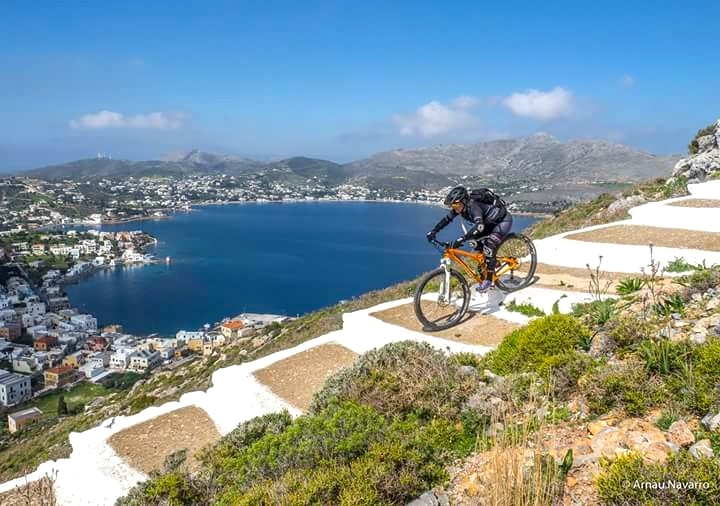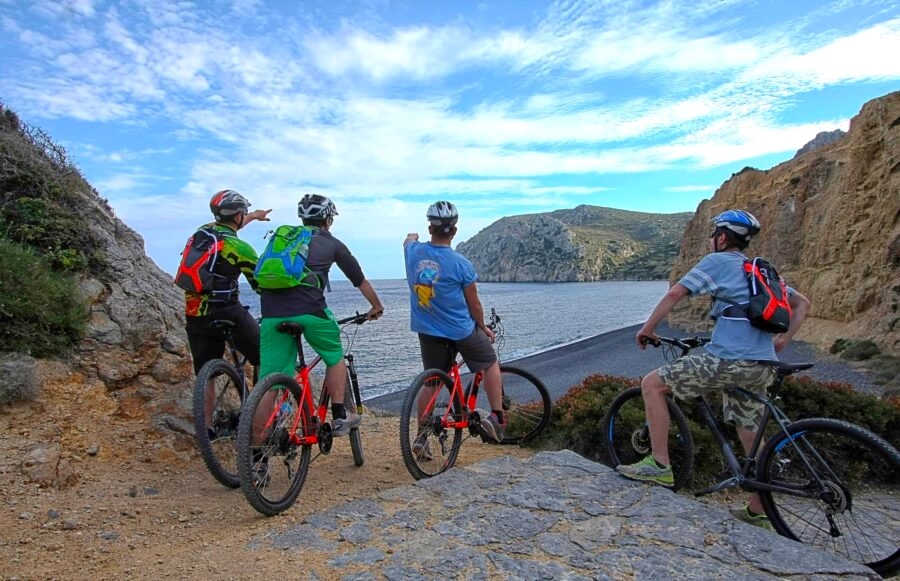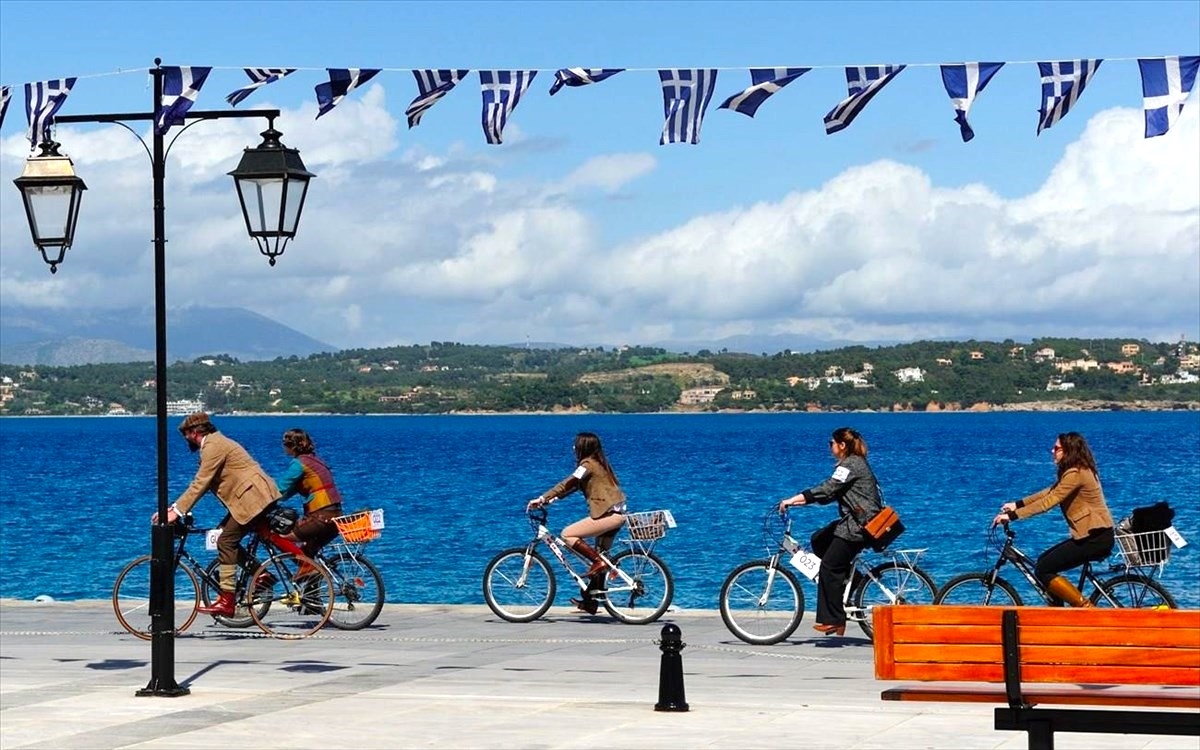Although Europe is home to some of the world’s most bicycle-friendly cities, Greece has been slow to embrace cycling as a means of transport and recreation. This is thankfully changing as more cities and towns invest in cycling infrastructure, and thanks to the launch of the Bike Friendly label.
To Vima International Edition spoke to Vicky Karantzavelou, the woman behind the Bike Friendly program in Greece, about how this initiative is accelerating the shift towards cycling and sustainability in the tourism sector’s and beyond.
Karantzavelou is the general manager of NatTour, the non-profit organization behind the Bike Friendly label which certifies hotels and destinations in Greece that meet international cyclist criteria. The program is an integral part of NatTour’s efforts to promote eco-friendly tourism and sustainable practices across the country.

Rising Demand for Responsible Travel
The idea, says Karantzavelou, began in 2016 when NatTour teamed up with the Hellenic Society for the Protection of Nature to introduce cycling as an alternative, eco-friendly tourism option.
The Bike Friendly program, she says, was a natural response to the rising demand for responsible holidays. “Travelers are becoming increasingly aware of their environmental impact and are looking for sustainable vacation options. The Bike Friendly label enables hotels and businesses to signal their commitment to sustainability and responsible tourism,” she says.
Launching the initiative in Greece, where cycling infrastructure is lacking and road safety questionable, was a bold move. Still, it has garnered support from the Greek ministries of Tourism, Energy & Environment, on the one hand, and Infrastructure & Transportation, on the other, both of which are keen to position Greece as a bicycle-friendly destination.
To date, 135 hotels and accommodation providers, 60 travel agencies and nine municipalities have been granted Bike Friendly certification. So far, the local authorities of Pieria, Kos, Chios, Alexandroupolis, Rethymno (Crete), Skiathos, Leros, Edessa and Aristotle (Halkidiki) have joined.
Beyond hotels and destinations, the program has attracted wineries and cafes, bike rental companies, travel and experiences organizers, creating a diverse network of cycling-friendly businesses.

Shifting Perceptions
Karantzavelou admits that the program faced significant challenges in its early stages. “One big obstacle was convincing people that cycling could be safe in Greece, especially given local perceptions about road safety,” she says. Hotel owners were hesitant about participating, fearing liability if a guest was injured while cycling. However, the growing popularity of cycling among tourists, many of whom bring their own bikes or simply love to cycle during their trips to Greece, has helped to shift perceptions.
To earn Bike Friendly certification, a business must meet specific requirements which include providing secure bike storage and maintenance facilities. Karantzavelou explains that participating in the program is a win-win for all, enhancing the guest experience and supporting local communities and businesses. “Hotels don’t have to invest in bikes. They can partner with local cycling businesses and activities agencies and provide holistic cycling experiences such as tours and excursions designed by experts.”
Cycling to Get a Sense of Place

Photo: Bike Friendly Greece
“Cycling not only brings visitors closer to nature, it also creates a sense of connection with the local way of life and fosters interaction,” explains Maria Lougari, manager of the adults-only Castelli Hotel on Zakynthos which was among the first to seek Bike Friendly certification.
“Many of our international visitors expect bike facilities and are eager to participate in our cycling tours. It adds value to their experience and aligns with our commitment to sustainability,” Lougari tells To Vima International Edition.
Castelli has recently also invested in e-bikes and guided day rides led by local experts as part of the hotel’s “sense of place” activities.
What’s more, the Bike Friendly network offers valuable guidance, best practices, and support to members, Maria Mavroudi, cofounder of Kallichoron Art Boutique Hotel on Astypalaia tells To Vima International Edition.
“We were among the first to join because we wanted to give visitors an eco-friendly way to discover the island and immerse themselves in the local way of life, and to stay ahead of a growing trend for fitness during travel,” Mavroudi explains.
Greece’s diverse landscapes further enhance its appeal as a cycling destination. “Greece is one of the few countries where, in under an hour, you can cycle from a seaside destination through a pine forest to a traditional village taverna,” says Konstantinos Athanasopoulos, a researcher at the Sustainable Mobility Unit (SMU) of the National Technical University of Athens (NTUA). The SMU, led by Thanos Vlastos, conducts research and provides data in support of cycling infrastructure and policy development in Greece. In collaboration with local cycling communities, Athanasopoulos created a comprehensive map of cycling paths across the country.
Cycling Gaining Traction in Greece

Photo: Bike Friendly Greece
Over the last decade, the Greek government has announced plans and incentives designed to encourage citizens to use environmentally friendlier modes of transport. The National Bicycle Strategy, introduced in 2020, aims to increase the use of bicycles in Greece by 2030. Additionally, programs like “Kinoume Elektrika” provide subsidies for e-mobility options, including e-bikes, as part of broader efforts to reduce carbon emissions.
The Municipality of Athens has also announced plans to invest in extensive cycling infrastructure, including bike routes connecting the city center to suburban areas like Kifissia, or Faliro on the coast.
In addition to the Bike Friendly label, the Greek Tourism Ministry has been trying to stimulate interest in cycling tourism by promoting railbiking: an alternative cycling sport which uses pedal-powered railroad carts on inactive railway lines.
“Cycling gives travelers the chance to visit lesser-known destinations and to get an authentic feel for the people and the local way of life. Bicycles turn transportation into an experience,” Athanasopoulos tells To Vima International Edition.
At the same time, he says, cyclists usually prefer to visit off-season in spring or fall when the weather is cooler, “contributing in this way to year-round tourism and fewer crowds.”
Meanwhile, Greece’s bike-friendly options have gained international visibility through collaborations with initiatives like EuroVelo, a network of 19 long-distance cycling routes connecting 40 countries across Europe. “The EuroVelo network includes the routes through Greece, making it easier for European travelers to discover our bike-friendly destinations,” Karantzavelou explains.
Looking ahead, NatTour is expanding its Bike Friendly program to include the “Greek Bike Specialist” label, which certifies tour operators offering cycling experiences in collaboration with Bike Friendly-certified hotels.
Additionally, Greece is participating in the “Adrioncycletour” project, an EU-backed initiative to develop a cycling route spanning nine countries along the Adriatic and Ionian coasts.



